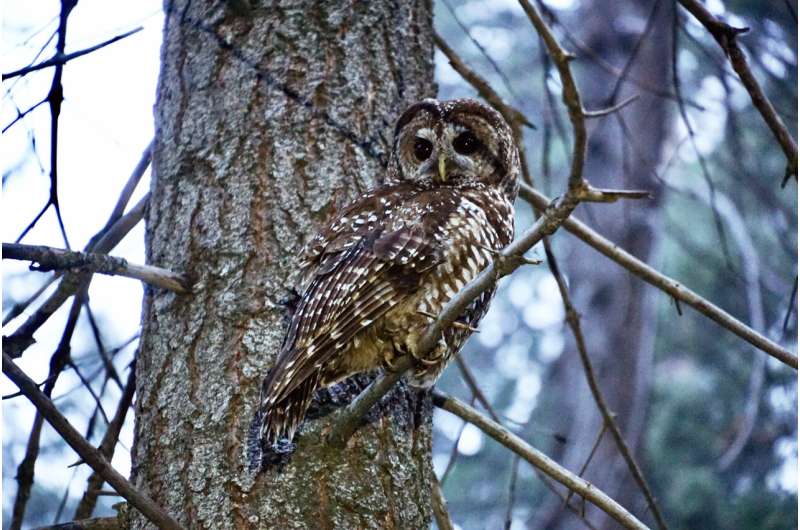This article has been reviewed according to Science X's editorial process and policies. Editors have highlighted the following attributes while ensuring the content's credibility:
fact-checked
trusted source
proofread
New audio technique used for census of California Spotted Owls in the Sierra Nevada ecosystem

For the first time, researchers have estimated the spotted owl population across the entire Sierra Nevada ecosystem. The analysis, which was led by researchers from the University of Wisconsin-Madison and the Cornell Lab of Ornithology's K. Lisa Yang Center for Conservation Bioacoustics, suggests that there are 2,218 to 2,328 adult owls on federally managed lands.
This research is published in the journal Ecological Indicators.
The Sierra Nevada is the home of the California Spotted Owl, one of three subspecies of spotted owl, and the only one that does not yet have federal protection under the Endangered Species Act. That is likely to change soon, as the U.S. Fish and Wildlife Service indicated in February that the Sierra Nevada population is likely to be listed as "threatened." According to Connor Wood, a Cornell Lab researcher who contributed to this analysis, getting a range-wide baseline estimate of the population will be critical for conservation.
"For years the spotted owl conservation community has wanted to understand what's happening with the owl across broad areas, and we've finally been able to provide an answer," Wood said.
The researchers drew on an array of over 1,600 autonomous recording units deployed across 24,000 km2. The key innovation that enabled the population estimate was figuring out how to combine data from hundreds of thousands of hours of acoustic data processed with cutting edge machine learning tools and conventional owl survey data from much smaller areas in which crews locate owls at night by imitating owl calls.
The ecological complexity of the Sierra Nevada and its rapid pace of change makes the broad scale of this survey particularly important.
"As the landscape of the Sierra Nevada changes due to drought, fire, and rising temperatures, this baseline will help us understand how each of those factors and more are affecting this iconic species," said Kate McGinn, a University of Wisconsin researcher who contributed to the analysis.
More information: Kevin G. Kelly et al, Estimating population size for California spotted owls and barred owls across the Sierra Nevada ecosystem with bioacoustics, Ecological Indicators (2023). DOI: 10.1016/j.ecolind.2023.110851
Provided by Cornell University


















